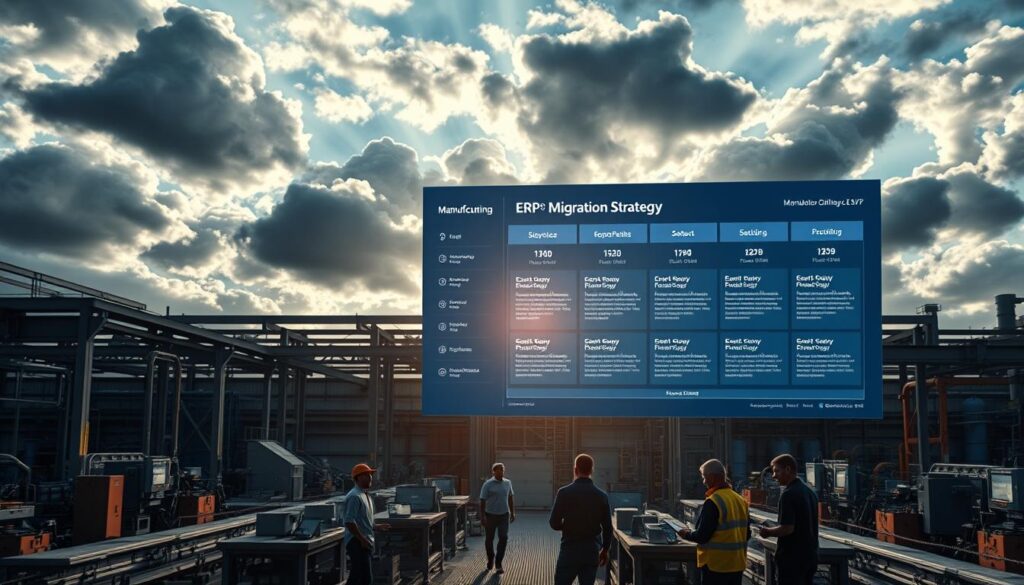In the rapidly evolving digital landscape, businesses must adapt to stay competitive. This SAP migration case study explores a transformative digital transformation journey of a prominent manufacturing enterprise in India, demonstrating the power of strategic cloud integration.
The manufacturing sector faces unprecedented technological challenges. Our case study reveals how strategic cloud migration can revolutionise operational efficiency, reduce costs, and unlock unprecedented business potential through intelligent technology implementation.
By embracing SAP cloud solutions, the manufacturing company navigated complex digital transformation challenges, creating a robust framework for sustainable technological growth and competitive advantage.
Key Takeaways
- Cloud migration enables significant operational streamlining
- Strategic SAP implementation reduces infrastructure costs
- Digital transformation requires comprehensive organisational planning
- Technological adaptability is crucial for modern manufacturing
- Cloud solutions provide scalable and flexible business environments
Understanding the Manufacturing Company’s Digital Transformation Journey
Digital transformation has become a critical strategy for manufacturing companies seeking to remain competitive in today’s rapidly evolving business landscape. Our case study explores a comprehensive enterprise resource planning migration that addressed significant technological challenges faced by a mid-sized manufacturing organisation.

Legacy System Challenges and Business Pain Points
The manufacturing company struggled with outdated technology infrastructure that hindered operational efficiency. Fragmented data systems created substantial communication barriers between departments. These legacy systems limited scalability, prevented real-time analytics, and increased operational costs significantly.
Setting Clear Objectives for Cloud Migration
Strategic cloud migration benefits became paramount for the organisation. Key objectives included streamlining business processes, enhancing data accessibility, and reducing IT infrastructure expenses. The company aimed to leverage cloud technologies to improve overall organisational agility and create a more responsive technological ecosystem.
Initial Assessment and Resource Planning
A comprehensive evaluation of existing technological capabilities guided the enterprise resource planning migration strategy. Stakeholders conducted detailed assessments of current systems, identifying potential risks and opportunities. This meticulous planning approach ensured a structured and methodical transition towards modernised cloud-based solutions.
SAP Migration Case Study: Implementation Strategy and Approach

The successful SAP implementation for this manufacturing enterprise began with a strategic roadmap designed to minimise operational disruptions. Recognising the critical need for digital transformation, the company embarked on a carefully planned SAP S/4HANA transformation journey that would modernise its entire technological infrastructure.
Key to the implementation strategy was a phased approach that prioritised system design and comprehensive testing protocols. The technology team meticulously mapped out each stage of migration, ensuring minimal interference with existing business processes. By working closely with specialised SAP implementation partners, the organisation developed a robust framework for transitioning critical data and workflows.
Precise planning became the cornerstone of their successful SAP implementation. The team conducted extensive workshops to understand potential challenges and develop mitigation strategies. They leveraged SAP best practices to create a seamless transition pathway, focusing on data integrity, system performance, and user experience throughout the SAP S/4HANA transformation process.
Risk management played a crucial role in the implementation approach. Detailed scenario planning and rigorous testing allowed the company to anticipate and address potential technical complexities before full-scale deployment. This proactive strategy ensured a smooth and efficient migration that aligned perfectly with the organisation’s strategic business objectives.
Business Process Optimisation and System Integration
The digital transformation journey reached a critical phase with comprehensive business process optimisation strategies. Our manufacturing client recognised the need for radical system improvements to drive operational efficiency and competitive advantage.
SAP system integration became the cornerstone of their technological revamp. The ERP modernisation approach focused on streamlining complex workflows, reducing manual interventions, and creating a more agile organisational infrastructure.
ERP Modernisation and Workflow Enhancement
Workflow enhancement involved mapping existing processes and identifying bottlenecks. By leveraging advanced SAP technologies, the company redesigned critical business operations to eliminate redundancies and accelerate decision-making capabilities.
Data Migration and Security Measures
Robust data migration strategies ensured seamless transfer of critical information to the cloud environment. Stringent security protocols were implemented to protect sensitive business data, mitigating potential risks associated with digital transformation.
Employee Training and Change Management
Successful digital transformation hinged on comprehensive employee training programmes. Targeted workshops and interactive learning modules helped staff adapt to new SAP systems, ensuring smooth transition and maximising technological investments.
Conclusion
The end-to-end project story of this SAP cloud migration demonstrates a powerful digital transformation journey for the manufacturing company. By strategically addressing legacy system challenges, the organisation achieved remarkable business outcomes that redefined its operational capabilities.
Key achievements highlight the success of this comprehensive migration strategy. The implementation resulted in a significant 40% cost reduction, enhanced operational efficiency, and improved decision-making processes. These outcomes underscore the critical importance of robust technological modernisation in today’s competitive manufacturing landscape.
Digital transformation is not merely about technological upgrades but about reimagining business potential. Other manufacturing organisations can learn from this case study by understanding that successful cloud migration requires a holistic approach. Integrated system planning, comprehensive employee training, and strategic resource allocation are fundamental to achieving transformative business results.
This SAP cloud migration journey serves as a benchmark for manufacturers seeking to leverage technology for sustainable growth. By embracing digital innovation, companies can unlock new levels of efficiency, resilience, and competitive advantage in an increasingly dynamic global market

